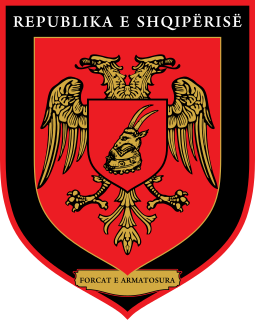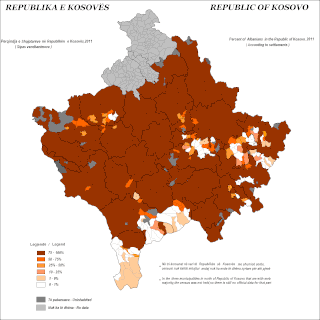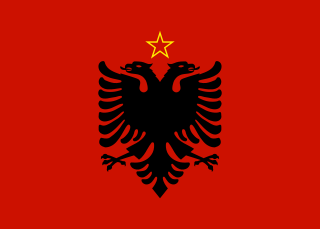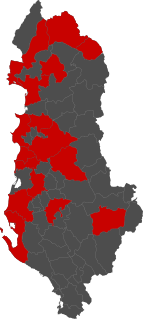Related Research Articles

Albania, officially the Republic of Albania, is a country in Southeast Europe on the Adriatic and Ionian Sea within the Mediterranean Sea. It shares land borders with Montenegro to the northwest, Kosovo to the northeast, North Macedonia to the east, Greece to the south and maritime borders with Greece, Montenegro and Italy to the west.

The Albanians are an ethnic group native to the Balkan Peninsula and are identified by a common Albanian ancestry, culture, history and language. They primarily live in Albania, Kosovo, North Macedonia, Montenegro, Serbia as well as in Croatia, Greece and Italy. They also constitute a diaspora with several communities established in the Americas, Europe and Oceania.

Enver Hoxha was an Albanian communist politician who served as the Prime Minister of Albania, as the First Secretary of the Party of Labour of Albania, from 1944 until his death in 1985. He was chairman of the Democratic Front of Albania, commander-in-chief of the armed forces from 1944 until his death. He served as the 22nd Prime Minister of Albania from 1944 to 1954 and at various times served as foreign minister and defence minister as well.
The history of Albania forms a part of the history of Europe. During the classical times, Albania was home to several Illyrian tribes such as the Ardiaei, Albanoi, Amantini, Enchele, Taulantii and many others, but also Thracian and Greek tribes, as well as several Greek colonies established on the Illyrian coast. In the 3rd century BC, the area was annexed by Rome and became part of the Roman provinces of Dalmatia, Macedonia and Moesia Superior. Afterwards, the territory remained under Roman and Byzantine control until the Slavic migrations of the 7th century. It was integrated into the Bulgarian Empire in the 9th century.

Kosovo, officially the Republic of Kosovo, is a partially-recognized state in Southeast Europe, subject to a territorial dispute with the Republic of Serbia.

Tirana is the capital and largest city by area and population of the Republic of Albania. The city was awarded the title of the European Youth Capital of 2022.

The Albanian Armed Forces are the military of Albania and were formed after the declaration of independence in 1912. Today, it consists of: the General Staff, the Albanian Land Force, Albanian Air Force and the Albanian Naval Force.

The flag of Albania is a red flag with a silhouetted black double-headed eagle in the center. The red stands for bravery, strength and valor, while the double-headed eagle represents the sovereign state of Albania. The flag was established as the national flag of Albania when the country gained its independence from the Ottoman empire in 1912.
The Counties of Albania are first-level administrative divisions in the Republic of Albania.

The Albania national football team is the men's football team that has represented Albania in international competition since 1946 and is controlled by the Albanian Football Association which is headquartered in the city of Tirana. The team is affiliated with UEFA and competes in the three major professional tournaments, the FIFA World Cup, UEFA European Championship and the UEFA Nations League. Albania was the winner of the 1946 Balkan Cup and the 2000 Malta Rothmans International Tournament. At Euro 2016, Albania made its debut at a major men's football tournament after 50 years. After its completion in 2019, Air Albania Stadium, also known as Arena Kombëtare will be the home ground of the national team. Albania's highest FIFA World Ranking was 22nd in August 2015.

The Parliament of Albania or Kuvendi is the unicameral representative body of the citizens of the Republic of Albania; it is Albania's legislature. The Parliament is composed of not less than 140 members elected to a four-year term on the basis of direct, universal, periodic and equal suffrage by secret ballot. The Parliament is presided over by a Speaker of the Parliament, who is assisted by at least one deputy speaker. The electoral system is based on party-list proportional representation. There are 12 multi-seat constituencies, corresponding to the country's administrative divisions.

The Albanian Superliga is a professional league for men's association football clubs. At the top of the Albanian football league system, it is the country's primary football competition. It is contested by 10 clubs, and operates on a system of promotion and relegation with the Albanian First Division. Seasons run from August to May, with teams playing 36 matches each.

The Albanians, also commonly called Kosovars, Kosovo Albanians, Kosovar Albanians or Kosovan Albanians, constitute the largest ethnic group in Kosovo.
The Albanian mafia or Albanian organized crime are the general terms used for criminal organizations based in Albania or composed of ethnic Albanians. Albanian organized crime is active in Europe, North America, South America, and various other parts of the world including the Middle East and Asia. The Albanian Mafia participates in a diverse range of criminal enterprises including trafficking in drugs, arms, humans, and human organs. The Albanian criminal scenario is characterized by diversified criminal plans which, in their complexity, show one of the highest criminal capacities in the world. In Albania alone, there are over 15 mafia families that control organized crime. According to WikiLeaks reports, the Albanian mafia has monopolized various international affiliations from as far east as Israel, to as far west as South America. These reports primarily indicate a strong connection between politicians and various Albanian mafia families. According to the Research Institute for European and American Studies (RIEAS), Albanian mafia groups are hybrid organizations, often involved in both criminal and political activities.
Albanian folk beliefs comprise the beliefs expressed in the customs, rituals, myths, legends and tales of the Albanian people. The elements of Albanian mythology are of Paleo-Balkanic origin and almost all of them are pagan. Albanian folklore evolved over the centuries in a relative isolated tribal culture and society. Albanian folk tales and legends have been orally transmitted down the generations and are still very much alive in the mountainous regions of Albania, Kosovo and western Macedonia, among the Arbëreshë in Italy and the Arvanites in Greece.

Albania, officially the People's Socialist Republic of Albania, was ruled by a Marxist-Leninist government from 1946 to 1992. From 1944 to 1946, it was known as the Democratic Government of Albania and from 1946 to 1976 it was known as the People's Republic of Albania.

The Italian protectorate of Albania, also known as the Kingdom of Albania or Greater Albania, existed as a protectorate of the Kingdom of Italy. It was practically a union between Italy and Albania, officially led by Italy's King Victor Emmanuel III and its government: Albania was led by Italian governors, after being militarily occupied by Italy, from 1939 until 1943. During this time, Albania ceased to exist as an independent country and remained as an autonomous part of the Italian Empire led by Italian government officials, who intended to make Albania part of a Greater Italy by assimilating Albanians as Italians and colonizing Albania with Italian settlers from the Italian Peninsula to transform it gradually into an Italian land.

Albanian is an Indo-European language spoken by the Albanians in the Balkans and the Albanian diaspora in the Americas, Europe and Oceania. With about 7.5 million speakers, it comprises an independent branch within the Indo-European languages and is not closely related to any other language.

This article documents the impacts of the 2019–20 coronavirus pandemic (COVID-19) in Albania, and may not include all the contemporary major responses and measures.

This article documents the impacts of the 2019–20 coronavirus pandemic (COVID-19) in Kosovo, and may not include all the contemporary major responses and measures.
References
| This article related to the Jurassic period is a stub. You can help Wikipedia by expanding it. |
| This Albania-related article is a stub. You can help Wikipedia by expanding it. |
| This article about a specific stratigraphic formation in Europe is a stub. You can help Wikipedia by expanding it. |